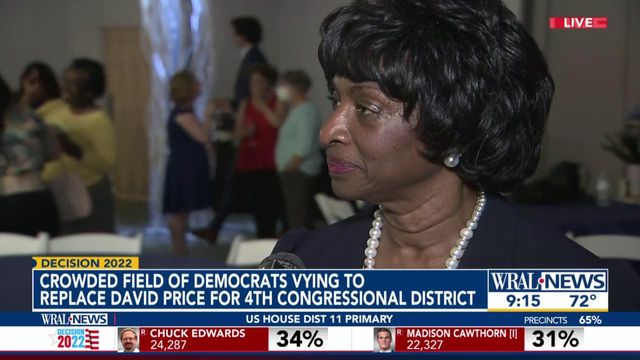State Sen. Valerie Foushee wins Democratic nomination in NC's 4th Congressional District, beating Aiken and Allam
The new 4th Congressional District includes Durham and Chapel Hill. Its voters are expected to elect a Democrat in the November general election.
Posted — UpdatedA state legislator from Orange County is one giant step closer to potentially replacing longtime Democratic Rep. David Price.
State Sen. Valerie Foushee on Tuesday led the Democratic primary in the 4th Congressional District. Price is retiring at the end of the year. She prevailed over other top competitors Clay Aiken and Durham County Commissioner Nida Allam, both of whom had strong name recognition.
The race was one of the most expensive primaries in the country, setting up a competition between Foushee as the big money, establishment candidate and other candidates who were more reliant on individual contributions.
The new 4th Congressional District includes Durham and Chapel Hill, stretches north to the Virginia border and as far west as Alamance County. Its voters are expected to handily elect a Democrat in the November election. Durham has historically been home to a safe Democratic district, and the Price seat is expected to remain that way even if state lawmakers could redraw congressional districts in the next few years.
Foushee benefited from support offered by U.S. Reps. Alma Adams and G.K. Butterfield. She also had the backing of the Congressional Black Caucus—and a record amount of outside spending.
About $3 million poured into the district from outside groups, the largest amount of outside funding spent on any North Carolina Congressional primary in recent memory. Most of that money went to Foushee.
With more than half of the precincts reporting, Foushee had a 49% of the vote—16 points ahead of Allam and 42 points ahead of Aiken.
Foushee will likely face leading Republican candidate Courtney Geels to represent the district, which is considered one of North Carolina’s few safe Democratic seats.
Foushee faced criticism and lost endorsements for not rejecting outside spending on her behalf by the American Israel Public Affairs Committee, a group that has previously endorsed Republicans, and by a committee founded by a cryptocurrency billionaire who has also previously supported Republicans.
Aiken and environmental scientist Ashley Ward, another candidate in the race, called out Foushee for her embrace of outside spending. Foushee responded by pointing out that AIPAC has supported House Speaker Nancy Pelosi and other Democrats, too.
The former “American Idol” star announced his political return in January, seeking to become the first openly gay congressional member to represent either of the Carolinas. He cited homophobia and racism from GOP lawmakers as a primary driver behind his decision to enter the race.
While Aiken has no experience in elected office, he was the only candidate who had previously won a congressional primary. He won a Democratic primary for a central North Carolina seat in 2014 before being handily defeated in the general election by then-Republican U.S. Rep. Renee Ellmers.
Allam, the first Muslim woman elected to public office in North Carolina, campaigned as the most progressive candidate. She secured endorsements from U.S. Sens. Bernie Sanders of Vermont and Elizabeth Warren of Massachusetts, as well as U.S. Reps. Pramila Jayapal of Washington, Ilhan Omar of Minnesota and Rashida Tlaib of Michigan.
On the campaign trail, Allam spoke frequently about climate change, economic inequality and abortion rights. The Durham County commissioner, who is now pregnant, had an abortion in 2021. In television ads, she described her personal connection to the issue and said she proceeded with the medical procedure out of concern for her personal health.
Related Topics
• Credits
Copyright 2024 by Capitol Broadcasting Company. All rights reserved. This material may not be published, broadcast, rewritten or redistributed.






